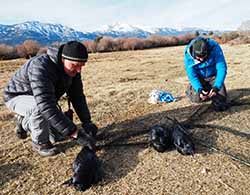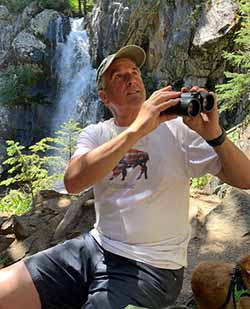
Ravens are known to scavenge from wolves and people, but the degree to which they exploit these and other sources of food has not been studied in detail. In 2019, John Marzluff and Matthias Loretto began tagging ravens in Yellowstone National Park with long-lasting satellite transmitters. After tagging more than 60 ravens and relating their movements to those of people and wolves, they gained an appreciation of their reliance on both as providers of food. In his talk, Dr. Marzluff will describe how the movements of territorial and non-breeding ravens can be related to wolf and human-provisioned foods, focusing on how the exploits of individual birds demonstrate variability. The team observed ravens at wolf kills, but it appeared that these discoveries were incidental, rather than the result of the ravens purposefully searching for them. As we begin to quantify the relationship between wolves and ravens we may learn more about their synchrony, but at present it appears to be weak, with discovery of kills occurring during the day rather than after communal roosting. Ravens made extensive use of anthropogenic resources, including direct handouts, wastewater treatment ponds, dumps, agriculture, roadkills, and hunter offal. Territorial ravens have extensive knowledge of the greater Yellowstone ecosystem and exploit areas in excess of 6,500 square miles.

John Marzluff is James W. Ridgeway Professor of Wildlife Science at the University of Washington. His graduate research (Northern Arizona University) and initial post-doctoral research (University of Vermont) focused on the social behavior and ecology of jays and ravens. He continues this work, investigating the intriguing behavior of crows, ravens, and jays and currently focuses on the interactions of ravens and wolves in Yellowstone. He teaches courses in ornithology, governance and conservation of rare species, field research in Yellowstone, and the natural and cultural history of Costa Rica.
Professor Marzluff has written six books and edited several others. Welcome to Subirdia (2014, Yale) shows that moderately settled lands host a splendid array of biological diversity and suggests ways in which people can steward these riches to benefit birds and themselves. His most recent book, In Search of Meadowlarks, (2020, Yale) connects our agriculture and diets to the conservation of birds and other wildlife.
Dr. Marzluff has mentored more than 40 graduate students and authored over 140 scientific papers on various aspects of bird behavior and wildlife management. He is a member of the U.S. Fish and Wildlife Service’s recovery team for the critically endangered Mariana Crow; a former member of the Washington Biodiversity Council; a Fellow of the American Ornithologist’s Union; and a National Geographic Explorer.

